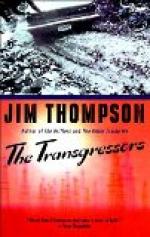An exceptional, an unprecedented bull panic is in progress. Brokers, messengers, clerks, every one connected with the Stock Exchange is in a flurry. Tickers are for the time being utterly forgotten.
In a corner of the Exchange sits the operator who has to send the doings of the day to the Press Association. He is unmoved by any excitement that may occur on the floor; it is an every-day experience with him. Stolidly he reads the tape, and jots down the advance in the stocks as a matter of course.
He has sent word to his office that Golding is to float the bond issue; but he knows that this news has reached the office through another channel before his belated report. He sends the message because it is a part of his routine.
“Calais, Oct. 12th,” are the words that now appear on the slip of paper he is scanning. “James Golding, accompanied by M. Tabort, French banking magnate, entered rear car Paris Express from London to cross the Channel. Car uncoupled in tunnel; explosion; both men instantly killed; submarine tunnel wrecked.”
Here is news. The instinct of the broker is awakened in the operator. He leaves his desk and walks rapidly to the pit. He places his hand on the shoulder of a prominent broker. In a few words he tells this man the news, and asks that the broker make him a “little something” for the tip.
With the news of Golding’s death this broker enters the pit as a seller. There are now but twenty minutes left before the closing of ’Change, yet by cautious work he will be able to sell out his holdings at the inflated prices that prevail. He alone of all the members of the Exchange knows that the greatest American financier is dead. On the morrow every stock on the list will depreciate. Now is the time for him to unload.
A hundred bidders are eager to buy the stock he offers. He reaps a fortune in the quarter of an hour before the ’Change closes; the rest of the brokers heap up trouble for the morrow. Five minutes before three the news of Golding’s death is brought to the brokers. It is too late. In their frenzy the men fear either to buy or sell. The floor is a veritable bear pit. Men swear and rage in impotent grief as they realize that they have brought ruin upon themselves by their rash speculation.
While this scene is in progress the world is being told of the death of the great Financier.
It will be recalled that to William Nevins was assigned the task of ending the career of James Golding. He has worked secretly, as have all the other members of the Committee of Forty. Now his role as shadow of the financier leads him to New York, while some banking scheme is being consummated; now he is rushing across the continent to be near the Magnate in San Francisco; the last trip takes him to Europe.




